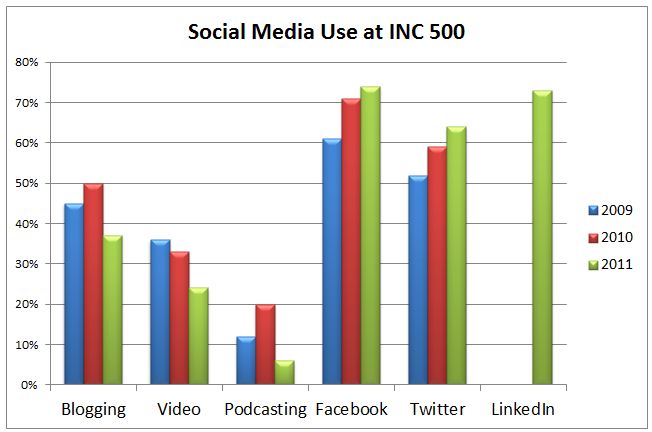Are America’s fastest-growing companies shifting away from blogging as a primary social media platform? “Maybe” could be a conclusion based on new research examining the INC 500 from The Center for Marketing Research at the University of Massachusetts.
For the first time in the five years that this research has been conducted, the use of blogging declined. Blogging had been steadily climbing as a corporate communications tool — 19% of the INC 500 blogged in 2007, 39% in 2008, 45% in 2009, 50% in 2010 and just 37% last year.
But there is an element of mystery here. Despite the decline, blogging was considered the most “successful” social media platform for the fourth consecutive year! In addition, among those companies not blogging, 62 percent are considering adding a blog.
How can we reconcile this seemingly inconsistent data? Is corporate blogging really declining? I have a theory that would conclude “no,” but before I explain my rational, let’s look at a few more interesting trends from this study:
Facebook and LinkedIn lead the way. For the first time, the platform most utilized by the Inc. 500 is Facebook with 74% of companies using it. Virtually tied at 73% is the adoption of the professional network, LinkedIn. As you can see in the graph above, video and podcasting use declined in this period. The researchers theorized that companies are spending more time on Facebook at the expense of blogs and video.
Social media investments will rise. 25% of the respondents said they plan to keep their social media budget the same in 2012, and 71% plan to increase their investment by 20% or more. Just one company had a plan to decrease the social media marketing budget.
Monitoring the social media buzz levels off. The 2011 study shows 68% of companies are using social media monitoring tools, down from 70% in 2010, which was the highest percentage of the past 5 years. Only 24% of the companies have a formal social media policy.
Measurement is inconsistent. When asked how they measured the effectiveness of their social media efforts, executives reported using fans, followers and supporters (26%), web traffic (25%), lead generation (16%), reduced cost of customer support (10%), the value of sales generated through social media programs (7%).
The work is being handled inside. Executives were asked how social media resource needs were filled in their companies. Two-thirds of the companies reported retraining or repositioning existing employees to handle their social media efforts, 10% use external consultants or agencies, 7% have made new hires specifically for their social media efforts.
Are company blogs really declining?
If you just read the headline of this study and looked at the graph at the top of this blog post, you would be hearing a death knell for blogging. But let’s not bury blogging so fast. Let’s apply a little critical reasoning to this study …
- It is important to consider that the data presented by the university researchers is not an apples-to-apples comparison. There is a tremendous “churn” of companies on the INC list. In fact, from 2007 when the survey started to 2011, the list of companies has almost completely changed.
- The authors admit that these changes have impacted the overall statistics in “distinct ways.” Most notably, there has been an increase in companies providing Government Services (a result of “Obama administration initiatives”). The researchers state that Government Services companies are among the least likely companies to blog. So in 2011, many traditional “blogging companies” were replaced on the list by companies that are unlikely to have blogs. If the researchers surveyed the exact same sample group, blogging levels may have even gone up in 2011.
- Also notable is that more than 60 percent of the companies on the INC 500 list did not exist in 2005. It is possible that these start-ups are not moving away from blogging to Facebook as the authors surmised. I think a more likely scenario is that these young companies are STARTING with Facebook because the entry barriers are so low compared to blogging. This would reconcile the curious fact that the companies with blogs see them as successful (why would they quit?) and that most companies who are not blogging plan to do so.
- Finally, another possible cause of the strange drop is sampling error. Only 34% of the INC 500 companies responded to the survey. Within the stated sampling errors, it is possible to conclude that the 2010 data and 2011 data are nearly identical.
It’s also interesting to note that the UMass researchers also do similar studies for non-profits, universities and Fortune 500 companies. In these studies — which have a relatively stable group of comparison organizations from year to year — blogging rates are level or on the rise. Why would the INC 500 companies be so different? I don’t think they are.
Is blogging dying? We can’t tell for sure, but I would not make that conclusion from this study. What do you think? What does business blogging look like where you work?
